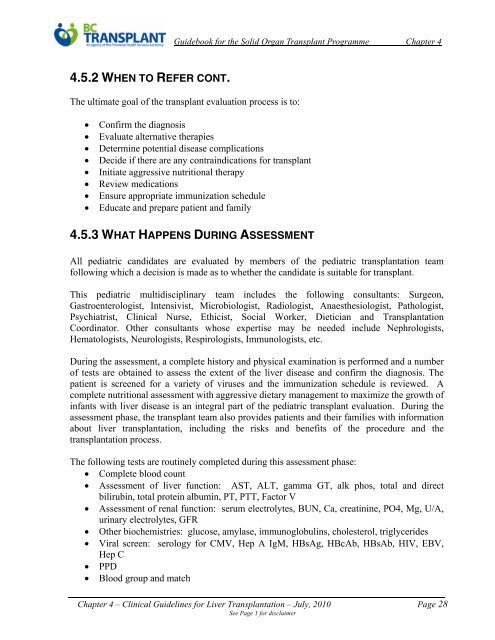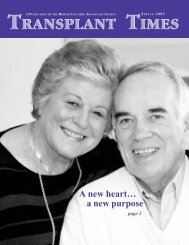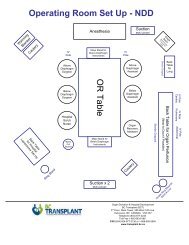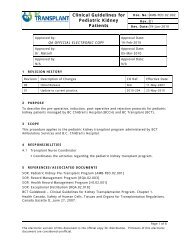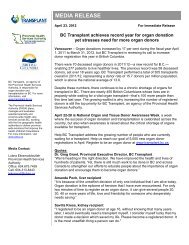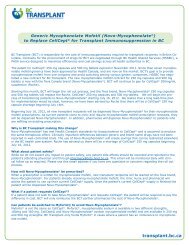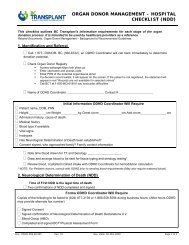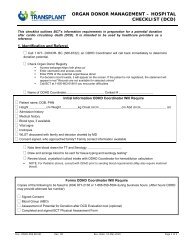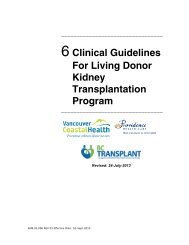4. Clinical Guidelines for Liver Transplantation (PDF) - British ...
4. Clinical Guidelines for Liver Transplantation (PDF) - British ...
4. Clinical Guidelines for Liver Transplantation (PDF) - British ...
You also want an ePaper? Increase the reach of your titles
YUMPU automatically turns print PDFs into web optimized ePapers that Google loves.
Guidebook <strong>for</strong> the Solid Organ Transplant Programme Chapter 4<br />
<strong>4.</strong>5.2 WHEN TO REFER CONT.<br />
The ultimate goal of the transplant evaluation process is to:<br />
<br />
<br />
<br />
<br />
<br />
<br />
<br />
<br />
Confirm the diagnosis<br />
Evaluate alternative therapies<br />
Determine potential disease complications<br />
Decide if there are any contraindications <strong>for</strong> transplant<br />
Initiate aggressive nutritional therapy<br />
Review medications<br />
Ensure appropriate immunization schedule<br />
Educate and prepare patient and family<br />
<strong>4.</strong>5.3 WHAT HAPPENS DURING ASSESSMENT<br />
All pediatric candidates are evaluated by members of the pediatric transplantation team<br />
following which a decision is made as to whether the candidate is suitable <strong>for</strong> transplant.<br />
This pediatric multidisciplinary team includes the following consultants: Surgeon,<br />
Gastroenterologist, Intensivist, Microbiologist, Radiologist, Anaesthesiologist, Pathologist,<br />
Psychiatrist, <strong>Clinical</strong> Nurse, Ethicist, Social Worker, Dietician and <strong>Transplantation</strong><br />
Coordinator. Other consultants whose expertise may be needed include Nephrologists,<br />
Hematologists, Neurologists, Respirologists, Immunologists, etc.<br />
During the assessment, a complete history and physical examination is per<strong>for</strong>med and a number<br />
of tests are obtained to assess the extent of the liver disease and confirm the diagnosis. The<br />
patient is screened <strong>for</strong> a variety of viruses and the immunization schedule is reviewed. A<br />
complete nutritional assessment with aggressive dietary management to maximize the growth of<br />
infants with liver disease is an integral part of the pediatric transplant evaluation. During the<br />
assessment phase, the transplant team also provides patients and their families with in<strong>for</strong>mation<br />
about liver transplantation, including the risks and benefits of the procedure and the<br />
transplantation process.<br />
The following tests are routinely completed during this assessment phase:<br />
Complete blood count<br />
Assessment of liver function: AST, ALT, gamma GT, alk phos, total and direct<br />
bilirubin, total protein albumin, PT, PTT, Factor V<br />
Assessment of renal function: serum electrolytes, BUN, Ca, creatinine, PO4, Mg, U/A,<br />
urinary electrolytes, GFR<br />
Other biochemistries: glucose, amylase, immunoglobulins, cholesterol, triglycerides<br />
Viral screen: serology <strong>for</strong> CMV, Hep A IgM, HBsAg, HBcAb, HBsAb, HIV, EBV,<br />
Hep C<br />
PPD<br />
Blood group and match<br />
Chapter 4 – <strong>Clinical</strong> <strong>Guidelines</strong> <strong>for</strong> <strong>Liver</strong> <strong>Transplantation</strong> – July, 2010 Page 28<br />
See Page 1 <strong>for</strong> disclaimer


